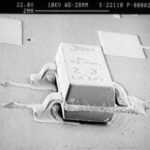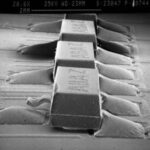
Luckily we have EE’s on staff with better soldering skills than I. Danny heard my complaints about the mysterious failure and offered to take a look. He handed me back a perfectly working remote 5 minutes later that has been performing flawlessly for over a month now.
So what did he know that I didn’t? A lot actually, but in this case the culprit was simple. Circuit boards absorb moisture and warp with age. The warp puts stress on some of the solder joints, causing them to fail. A quick inspection under magnification showed a cold solder joint. A few seconds with a hot iron and it was good as new. Solder failure.
Danny gave me a couple of tips for handling this next time.
- All circuit boards warp with age. The telltale sign is if the failure comes and goes with flexing the board, it is probably caused by warping.
- You have little to lose by reflowing the solder and seeing if that helps.
- The thinner, cheaper circuit boards tend to warp more.
- The more layers, the more susceptible the board is to warping.
Some additional research on solder failures lead me to the TechnoLab website – they have some fantastic images and descriptions of different inspection issues
